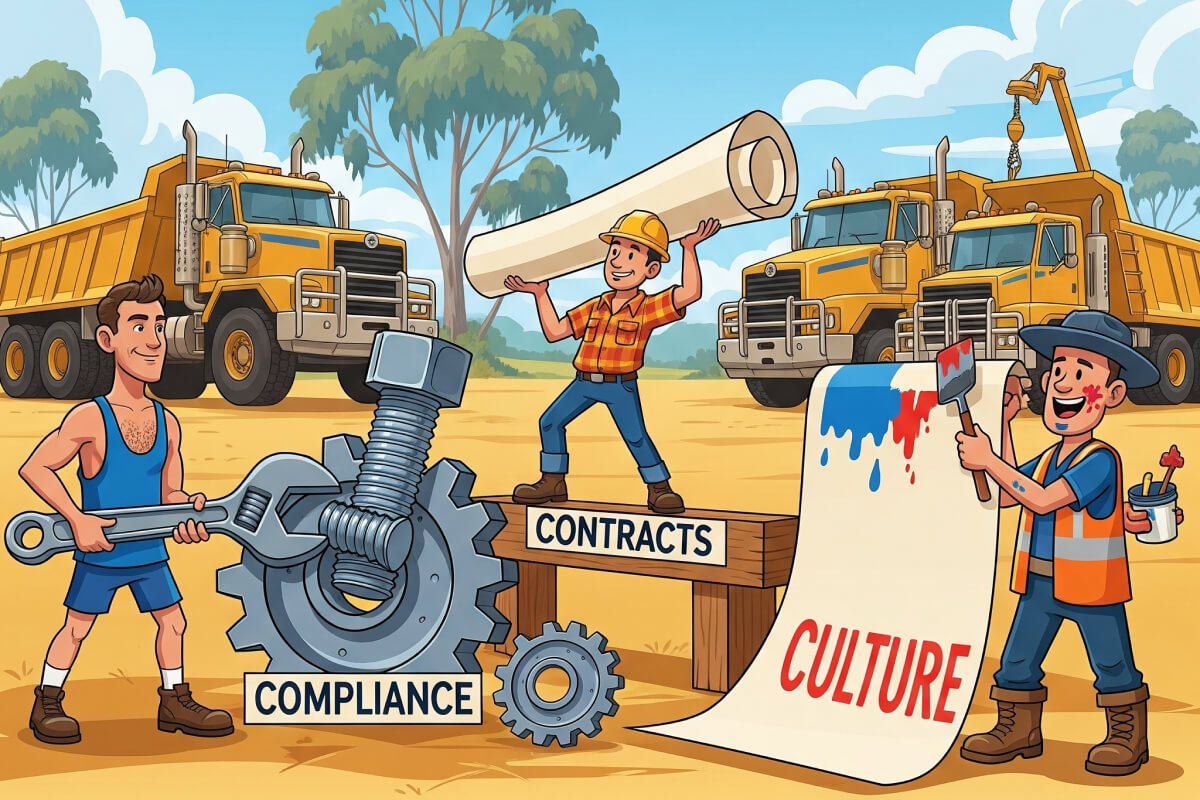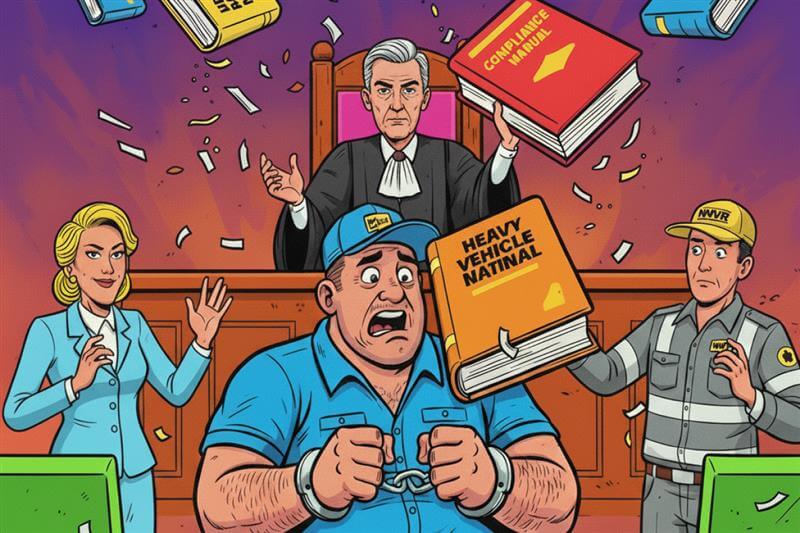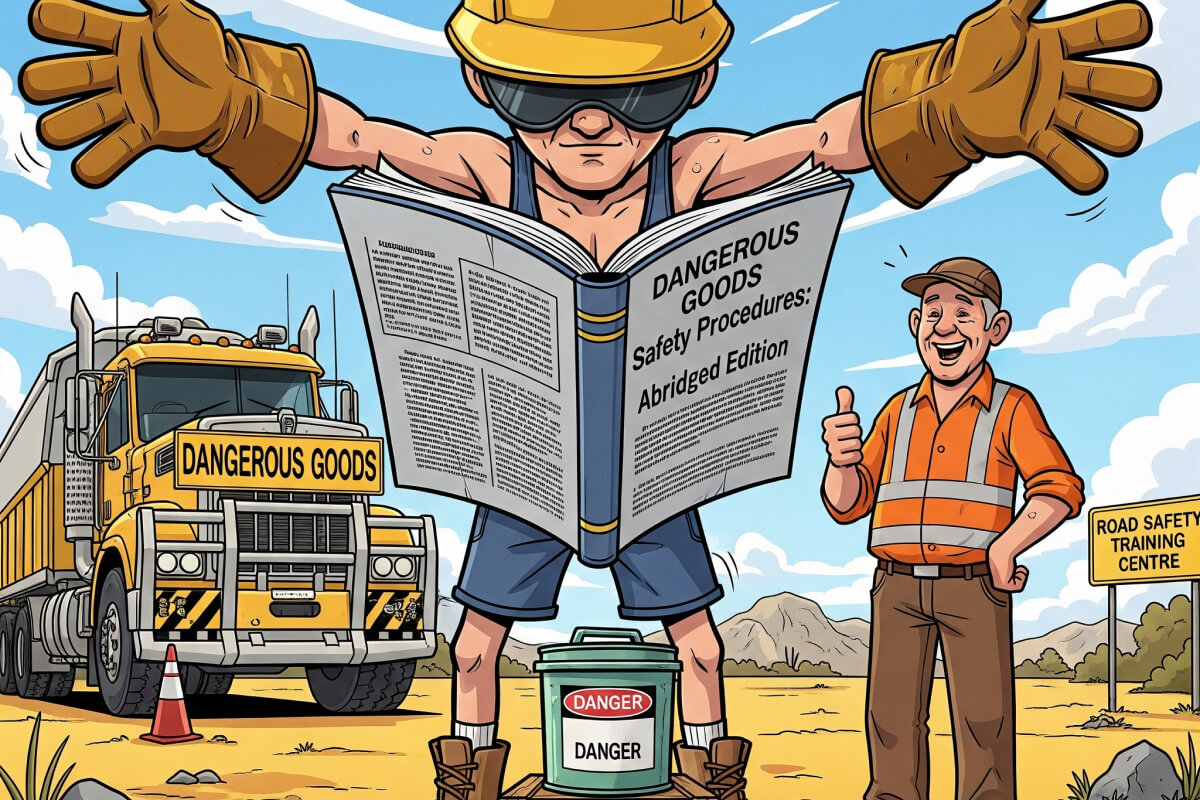
As many of you know, my passion lies in supporting the heavy vehicle transport industry and that’s exactly what we aim to do with our Risky Business podcast, proudly sponsored by Hubfleet. In this latest episode, I was joined by my co-host Craig Forsyth, and we were fortunate to welcome Warren Clark, CEO of NATROAD, and Chris Roe, a seasoned owner-driver with 5 decades on the road. Their perspectives, one from the policy front line, the other from the driver’s seat, offered a compelling and honest look at what’s broken in transport, and how we can start to fix it.
We began with a sobering reality: in the 12 months to March 2025, 157 lives were lost in crashes involving heavy vehicles, contributing to a total of 1,329 road deaths across all vehicle types. With a fatality rate of 9.5 per 100,000 workers, transport remains the second most dangerous industry in Australia—just behind agriculture. These aren’t just figures, they’re a wake-up call. They’re a reminder of the daily risk our industry carries and the urgency with which we need reform.
You can listen to the full episode here:
| Listen to the full episode on | ||
| Spotify | Soundcloud | Apple Podcast |
For those who don’t have time to listen to the full episode, here’s an overview below of what we covered:
Minimum Standards
A core theme of our discussion was the complete lack of minimum standards for the transport industry in Australia, especially when compared to other countries with similar transport industries. This absence, as we explored, contributes to a “race to the bottom,” where work is awarded to the cheapest bidder, often without regard for safe, compliant operations. This can lead to operators cutting corners, resulting in delayed maintenance, sham contracting, and underpaid workers pushed to their breaking point – consequences that play out on our roads every day.
Minimum Standards Orders (MSOs) and Contract Chain Orders (CCOs)
The good news is that solutions are emerging through the “Closing the Loopholes Bill,” which has introduced the Fair Work Road Transport Advisory Group (RTAG). RTAG is a body that has the ability to set Minimum Standards Orders (MSOs) and Contract Chain Orders (CCOs). We explained that a contract, in Australian law, can even be a verbal agreement or a handshake deal, or simply accepting a load. MSOs are designed to set enforceable minimum standards for contractual arrangements, particularly for owner-drivers and small businesses, improving fairness and safety. CCOs are crucial as they ensure that all parties in the contractual chain, from large retailers to logistics providers, comply with these standards, holding everyone accountable.
This is where technology becomes a critical partner. Platforms like Hubfleet are designed to help operators navigate these new regulations seamlessly. Our system helps you meet the demands of MSOs and CCOs by providing a digital, verifiable record of compliance. For example, our Electronic Work Diary (EWD) not only ensures drivers stay within their work hours but also provides the detailed, accurate data needed for audits, turning a complex administrative burden into a simple, automated process.
Maximum 30 Days Payment Terms
These orders can cover vital aspects like payment terms (for example, the current Contract Chain Order 2024/4 aims for a maximum of 30-day payment terms, addressing the crippling issue of 90-day or even 120-day payment cycles that can financially ruin operators). They can also include safety requirements not already covered by other laws, and dispute resolution processes. What they can’t do, however, is duplicate or override existing comprehensive legislation such as work health and safety laws or heavy vehicle national laws.
Beyond legislated payment terms, one of the biggest silent killers of profitability is unpaid waiting time. We talked about how MSOs can cover dispute resolution, and this is where having irrefutable evidence is paramount. Hubfleet’s software leverages advanced GPS data and geofencing technology to provide that evidence. By setting up virtual boundaries (geofences) around depots, ports, and delivery points, Hubfleet automatically creates a digital, time-stamped record of when a vehicle enters and exits a location and even creates alerts when time in a given area exceeds a specified threshold. This automated process accurately documents every minute of waiting time, creating an indisputable log that can be used to support claims for compensation and help operators protect their bottom line from the crippling effects of ‘mobile storage’ and payment delays.
Fair Work Applications for MSOs and CCOs
A significant point we discussed was how applications for MSOs and CCOs can be made by various parties, including transport operators, contractors, industry associations like NATROAD (my guest Warren Clark’s organisation), unions, or any party affected by unfair terms. This process, while taking time (around 18 months), is a vital mechanism for change, potentially even paving the way for minimum operator conditions without waiting for lengthy HVNL reviews.
Collaboration Across Associations
We also highlighted the immense importance of collaboration across associations like NATROAD, NRFA and even with unions like the TWU, noting that despite past differences, there’s a strong appetite to work together for industry-wide change. The unity of industry voices, providing real-world stories and evidence, is paramount to getting legislative change enacted.
Chris Roe: Five Decades of Driving, and a Lifetime of Determination
To round out the episode, we welcomed back Chris Roe, an owner-driver with five decades on the road. Chris has always been a straight shooter, and his words carry the weight of someone who’s lived through every version of this industry, good, bad, and broken.
In this episode, we reflected on a powerful line he once shared with me:“
Old men plant trees whose shade they know they shall never sit under.”
Chris was quick to point out it wasn’t originally his phrase, he credits the Greek philosophers, but he’s certainly made it his own. For him, it’s not about legacy in the ego sense. It’s about leaving the industry better than he found it. “All we can do,” he said, “is get up every morning and keep batting.”
Showing Up, Sharing Your Story, and Supporting Change
Chris may never see the full benefit of the reforms he’s helped fight for, but that doesn’t stop him from showing up, sharing his story, and supporting change. He’s not looking for praise, he’s driven by a stubborn sense of determination, something he said he’s always carried, even back in his footy days when he might not have won Best and Fairest but always walked away with Most Determined.
Importance of Industry Collaboration
That kind of grit matters. It’s the kind of persistence that’s helped push long-overdue reforms like Minimum Standards Orders forward. It’s also the reason Chris continues to work alongside associations like NRFA, NATROAD, and even the TWU when it comes to shared goals. As he said on the show, “There are still strong differences, sure, but we’ve agreed on the things we can work together on. That’s an achievement that shouldn’t go unrecognised.”
He’s also keenly aware of the damage done when the industry turns on itself. We talked about how easy it is for critics to mock collaboration efforts between associations and unions “singing Kumbaya” as some put it, but Chris had no time for that. He knows that real reform only happens when people stop point-scoring and start pulling in the same direction.
Would You Go Back To Being an Owner-Driver?
In fact, he even turned the tables at one point and asked both me and Craig a pointed question: “Given the current state of the industry, would you go back to being an owner-driver?”
Both Glyn and Craig responded yes to the question, with Glyn adding a note of caution. While the passion for the job is still strong, Glyn reflected that returning to the role today would be a much more complex decision due to how much the operating environment has changed. He acknowledged that his previous model of owner-driving may not be viable under the current economic and regulatory conditions. The exchange highlighted both their continued love for the work, and the reality that today’s challenges would make it far harder to succeed than in years past.
Final Reflections
Chris’s reflections are a reminder that industry reform isn’t just about laws and contracts. It’s about people. It’s about the quiet resilience of someone who refuses to walk away bitter, who doesn’t want to be “that bloke in the background criticising the next generation.” It’s about planting trees. And trusting that, someday, someone will sit in their shade.
Ultimately, our goal, and the goal of these new orders, is to create a more sustainable, fair, and safe environment for every transport professional. It’s about ensuring that those at the top of the supply chain play an active role in supporting safe operations, and that corner-cutting due to financial pressure becomes a thing of the past. Hubfleet is your digital partner in this new era, providing the tools to manage fatigue compliance, track maintenance, and, most importantly, use automated geofences to document your wait times and ensure you get paid for every minute you work.
Thank you for tuning in to the “Risky Business” podcast. At Hubfleet we’re committed to bringing you the information you need to navigate our complex industry safely and compliantly.
Lets help lift industry standards, Sign up for a free 14 day trial to see how Hubfleet helps you manage compliance, track maintenance, and use GPS and geofencing to document your time to the minute.







